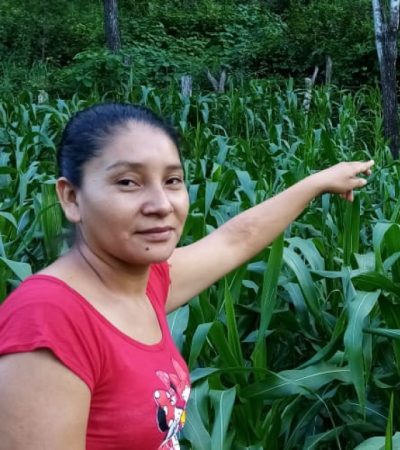Feed the Future is working in Honduras to reduce poverty and malnutrition in rural areas, regions where the challenges of developing income-generating production systems for subsistence farmers are compounded by unpredictable and extreme climatic conditions. In many rural communities, irregular and erratic rainfall has led to drought conditions and increases in crop pests, causing productivity declines and total or partial crop losses for a wide range of crops. According to the Climate Change Vulnerability Assessment done for western Honduras in 2014, rainfall anomalies will continue to affect the region, and a 10 to 20 percent decrease in rainfall is anticipated by mid-century. Subsistence farmers, with monocrop and traditional rain-fed production systems, are especially susceptible to crop and income losses.
Feed the Future is introducing agricultural practices and technologies to growers that provide adaptation measures to increase productivity, profitability, and risk reduction over the short and long term and, at the same time, have positive effects on the environment and future adaptability. Results to date have shown that the use of good agricultural practices, technology, income generation and climate adaptation are all linked. Incomes are increased, and risks are reduced by the adoption of basic production practices and diversification of crops and income sources. Farmers whose incomes are increasing are more open to adopting new practices that reduce climate risks and others that contribute to the reduction of greenhouse gases.
The use of basic production practices is a first step for a more climate-compatible agriculture system to function. Practices and technologies that have been applied in Honduras include contoured beds, drainage systems, application of organic material, mulching, soil pH adjustment, erosion barriers, pest and disease scouting, crop selection, rotation and diversification, drip irrigation, diluted fertilizer applications, pruning systems, and postharvest handling methods. Grower groups with new small-scale irrigation systems have formed to protect, manage and reforest water sources as a way to safeguard future water provision. Monthly charges for use and maintenance have been introduced.
Crop and income source diversification is key to risk reduction, as a prosperous farmer is more resilient to shocks. Feed the Future growers in Honduras have increased their yields from basic grains to cover home consumption and have started to free up land to work with small areas of higher value crops, such as vegetables. This shift, which takes at least two years, allows farmers to expand the area under high-value crop production, improve the application of practices and technologies, and obtain further increases in the yields of basic grains, horticulture and coffee. A typical family reduces their susceptibility not only to climate, but also to pest and market conditions, while also increasing their incomes to move out of poverty and their capacity to recover from shocks.
With confidence in the new production systems and increased incomes, growers and communities are able to move from a day-to-day existence to long-term planning that includes investments in their health, education and the protection valuable natural resources such as water, soil and forests.


